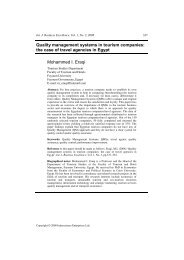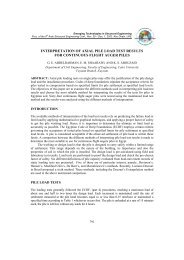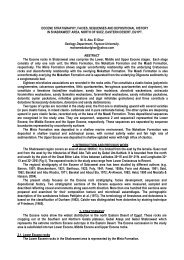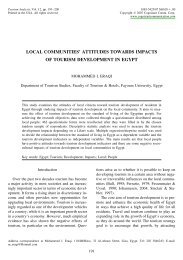INVESTIGATING E-COMMERCE ADOPTION IN SMALL AND ...
INVESTIGATING E-COMMERCE ADOPTION IN SMALL AND ...
INVESTIGATING E-COMMERCE ADOPTION IN SMALL AND ...
Create successful ePaper yourself
Turn your PDF publications into a flip-book with our unique Google optimized e-Paper software.
<strong><strong>IN</strong>VESTIGAT<strong>IN</strong>G</strong> E-<strong>COMMERCE</strong> <strong>ADOPTION</strong> <strong>IN</strong> <strong>SMALL</strong> <strong>AND</strong><br />
MEDIUM-SIZED TOURISM ENTERPRISES: A CASE OF<br />
TRAVEL AGENTS<br />
<strong>IN</strong> EGYPT<br />
by<br />
MOHAMED AHMED ABD-ELRAOUF ABOU-SHOUK<br />
A thesis submitted to the Plymouth University<br />
in partial fulfilment for the degree of<br />
DOCTOR OF PHILOSOPHY<br />
School of Tourism and Hospitality<br />
Faculty of Plymouth Business School<br />
November 2012
Abstract<br />
SMEs are often described as slow adopters of technology. However, adopting<br />
e-commerce is one of many strategies taken by travel agents to reintermediate<br />
themselves in the global travel market against the threat of<br />
disintermediation. Exploratory studies have revealed that Egyptian travel<br />
agents are laggards when it comes to technology adoption, although they<br />
perceive e-commerce as a beneficial tool that can increase their chances of<br />
survival. As many as 59.2% of Egyptian travel agents were found not to have<br />
websites (Egyptian Travel Agents Association, 2008), this study investigates<br />
the factors affecting e-commerce adoption by travel agents.<br />
Past literature has shown that there are three main factors affecting the<br />
adoption of e-commerce by SMEs. Environmental pressures push SMEs to<br />
adopt in order to bolster their survival chances. The benefits of adoption are<br />
critical factors considered by managers when making the adoption decision.<br />
Finally, there are barriers to e-commerce adoption. By modifying the<br />
technology acceptance model, this research conceptualizes the causal<br />
relationships amongst these three types of factors. The benefits and barriers<br />
to e-commerce adoption are found to mediate the relationship between<br />
environmental pressures and e-commerce adoption.<br />
This study employs mixed methods starting with a quantitative survey and<br />
following it up with qualitative interviews. A questionnaire was used to collect<br />
data from 411 adopter and non-adopter e-commerce travel agents. Later, 22<br />
interviews were conducted with the managers of travel agents. Structural<br />
equation modelling produced findings reveal that environmental pressures<br />
significantly affect the perceived benefits of and barriers to adoption, in<br />
addition to having an indirect effect on adoption behaviour.<br />
This study contributes to theory as it responds to the claim that the factors<br />
affecting e-commerce adoption have not been well documented in the travel<br />
sector (Hung et al., 2011, Thomas et al., 2011), especially in the context of<br />
developing countries (Thulani et al., 2010). The findings reveal that the<br />
modified technology acceptance model successfully interprets e-commerce<br />
adoption. The study compares other adoption models with the research model<br />
and provides statistical criteria for this comparison.<br />
Its contribution to practice is twofold, affecting the managers of travel<br />
agencies and policy makers. Recognizing the factors affecting adoption would<br />
enable managers to devise strategies and prepare better agendas for<br />
expanding their businesses, while at the same time identifying any defects<br />
and training needs that present barriers. Meanwhile, recognizing the barriers<br />
to adoption could encourage government bodies and policy makers to
implement appropriate measures, such as introducing protective and financial<br />
legislation to encourage SMEs to adopt technology, or to formulate national<br />
policies and initiatives aimed specifically at supporting the adoption of e-<br />
commerce by SMEs.

















